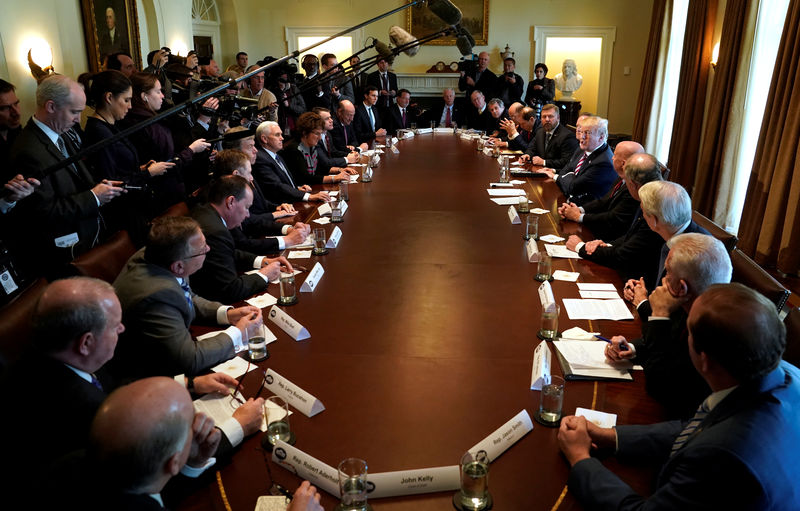By Roberta Rampton and David Lawder
WASHINGTON (Reuters) - U.S. President Donald Trump said on Tuesday he was considering a range of options to address steel and aluminum imports that he said were unfairly hurting U.S. producers, including tariffs and quotas.
Trump's comments - his strongest signal in months that he will take at least some action to restrict imports of the two metals - came in a meeting with a bipartisan group of U.S. senators and representatives at the White House. Reporters were present for part of the meeting.
Some of the lawmakers urged him to act decisively to save steel and aluminum plants in their states, but others urged caution because higher prices would hurt downstream manufacturers that consume steel and aluminum.
Trump is weighing options presented last month by the U.S. Commerce Department in parallel "Section 232" investigations into whether import restrictions on steel and aluminum are needed to protect national security. The probes were authorized under a 1962 trade law that has not been invoked since 2001.
"What we're talking about is tariffs and/or quotas," Trump said to the group.
"Part of the options would be tariffs coming in. As they dump steel, they pay tariffs, substantial tariffs, which means the United States would actually make a lot of money."
Trump said that the steel and aluminum industries were being "decimated by dumping" and talked about the empty steel mills he saw on the campaign trail in 2016.
"I look at it two ways: I want to keep prices down, but I also want to make sure that we have a steel industry and an aluminum industry, and we do need that for national defense," Trump said.
U.S. steel stocks rose broadly after the comments, with the S&P 1500 steel index closing up 1.1 percent and outperforming the broader market. Alcoa Inc (NYSE:AA) shares ended 1.4 percent higher, with Century Aluminum up 0.5 percent.
Trump now has until around April 11 to decide whether to impose steel import curbs and April 20 to decide on aluminum restrictions. The Commerce Department has not revealed its recommendations in the probes launched last spring.
But Commerce Secretary Wilbur Ross told the lawmakers that Section 232 powers "can be applied in a much more surgical way" that could lead to tariffs on imports from certain countries and quotas from other nations suspected of transshipping products.
Some lawmakers came away from the meeting with the impression that Trump would impose some restrictions but understood the need for a balanced approach.
"My belief is he'll take some action, but he was truly open to seeking input at the meeting today," Senator Roy Blunt, a Missouri Republican, told reporters at the Capitol.
Blunt, who said Missouri industries both make and consume steel and aluminum, told Trump in the meeting: "I think we do need to be careful here that we don't start a reciprocal battle on tariffs."
STEEL USED IN ENERGY INDUSTRIES
Several lawmakers cited the need to maintain U.S. energy independence and the electrical grid. They urged steps to protect U.S. producers of oil drilling and transport pipe and noted AK Steel is the last American producer of electrical steel for electric transformers.
Senator Rob Portman, a Republican from steel-intensive Ohio, told Trump that without relief from imports, AK Steel is "going to pull out of this business, so we won't have the steel that goes into our transformers and our grid."
Republican Senator Pat Toomey of Pennsylvania cautioned that it would be difficult for Trump to justify a national security ruling when defense products consume only 3 percent of domestic steel output."So I think it's implausible to believe that we're not able to meet the needs of our defense industry, which is absolutely essential," he said.
Steelmakers recently urged Trump to take broad action to reduce steel imports to curb global excess steel production capacity, largely in China..
Asked about Trump's steel comments, Chinese Foreign Ministry spokesman Geng Shuang said the world economy was recovering and all parties should cherish the momentum and send signals of cooperation and mutual benefit.
At this time, any unilateral or protectionist moves would harm countries and damage the trade environment, Geng told reporters in Beijing.
"All parties should make an all-out effort to avoid this."
A Chinese government think-tank warned earlier that "unreasonable" U.S. trade actions on steel will be met with "countermeasures" under World Trade Organization rules.
Steel and aluminum users, meanwhile, have urged caution in any restrictions to avoid disruptions or price spikes in the raw materials used in everything from autos to appliances and aircraft and construction.

The Motor and Equipment Manufacturers Association, representing auto parts makers with 871,000 U.S. employees, urged Trump in a letter on Tuesday to exclude an extensive list of products from import restrictions, from tire cord steel to high-pressure aluminum die castings.